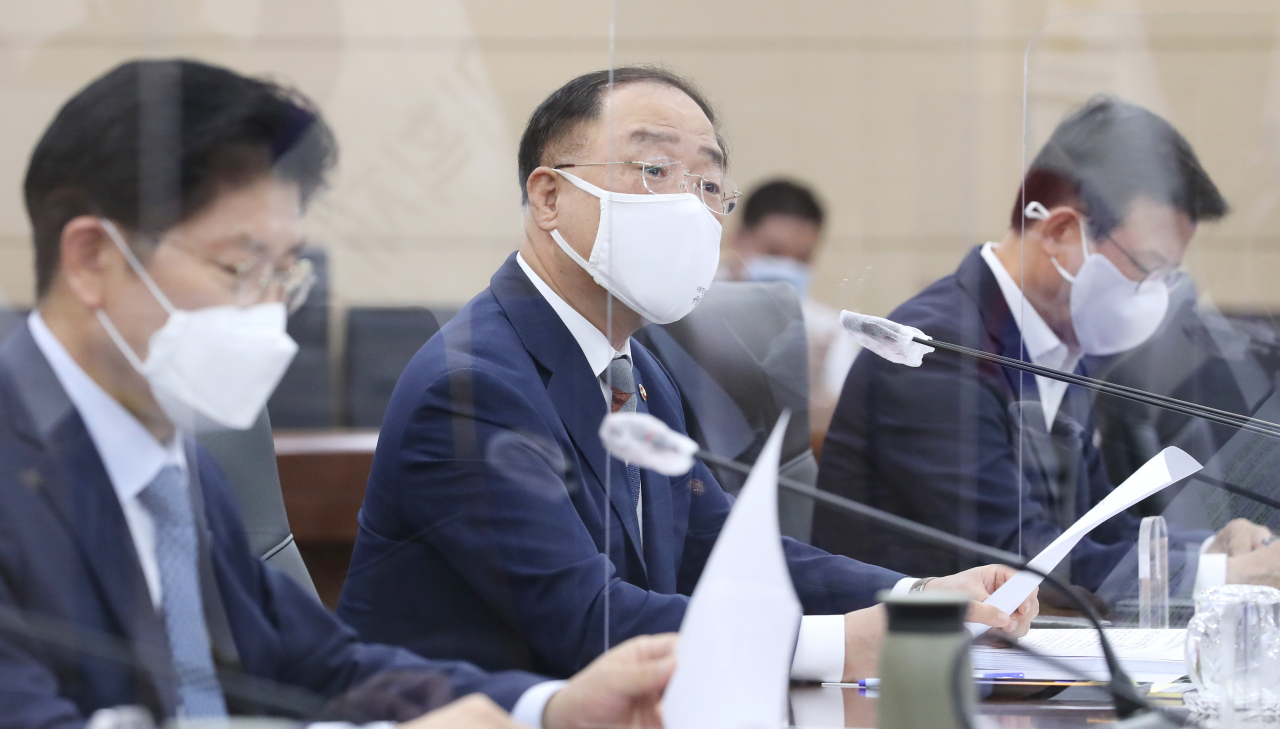 |
Finance Minister Hong Nam-ki speaks during an economic ministers meeting held at the government complex in Sejong, Monday. (Ministry of Economy and Finance) |
With signs of recovery in the global construction market, the government said Monday it would make an all-out effort to achieve its goal of securing $30 billion worth of overseas construction deals this year.
“Large-scale infrastructure investment demand from developed and developing countries is expected to grow as the global construction market is expected to recover this year,” Finance Minister Hong Nam-ki said.
Korean construction firms won overseas orders worth $14.7 billion in the first six months of the year, down 9 percent from a year earlier as the COVID-19 pandemic dealt a blow to the sector. They secured overseas deals worth $35.1 billion last year.
To achieve the $30 billion goal, the country’s policy lender Export-Import Bank of Korea plans to expand loans and cut lending rates or commissions to Korean companies that invest in overseas projects.
In a move to take on riskier bets, the lender will provide a 1.8 trillion-won financial support program for infrastructure projects to be carried out in countries with credit ratings below B+.
Following its $5 billion loan agreement with Abu Dhabi National Oil Company, the state-owned oil company of the United Arab Emirates in June, Eximbank will seek to ink similar framework agreements with other tenderers, such as Saudi Arabia’s Aramco and Qatar’s Qatar Petroleum. Such deals aim at helping Korean bidders to win orders by promising credit issuance.
The government has said it will continue policy support to prevent overseas business from shrinking due to COVID-19. For a businessperson who needs to attend an urgent business trip, the government will provide a fast-track vaccination system to shorten the time from applying for vaccination to completing the second vaccination from three months to less than one month.
It will also offer up to 12 hours of legal consultation per company to help them resolve disputes such as unavoidable delays in construction work stemming from the pandemic.
Meanwhile, the finance minister vowed a firm response to ensure that the national interest won’t be damaged by new digital taxes and global corporate minimum taxes endorsed by 130 countries and jurisdictions last week.
“In the process of digital tax discussion, we will thoroughly respond to the impact on Korean companies and the distribution of taxation rights from the viewpoint of the national interest,” he said.
Hong said he will actively join the discussion while attending the meeting of the G-20 finance ministers in Venice, Italy, this week. The new international tax rules are expected to take effect in 2023, after details of the agreement are finalized by October.
Among Korean conglomerates, Samsung Electronics and SK hynix are likely to be subject to the new tax rule that requires multinational companies to pay taxes where they conduct sustained and significant business, even if they do not have a physical presence there.
By Park Han-na (
hnpark@heraldcorp.com)








![[Today’s K-pop] Blackpink’s Jennie, Lisa invited to Coachella as solo acts](http://res.heraldm.com/phpwas/restmb_idxmake.php?idx=644&simg=/content/image/2024/11/21/20241121050099_0.jpg)